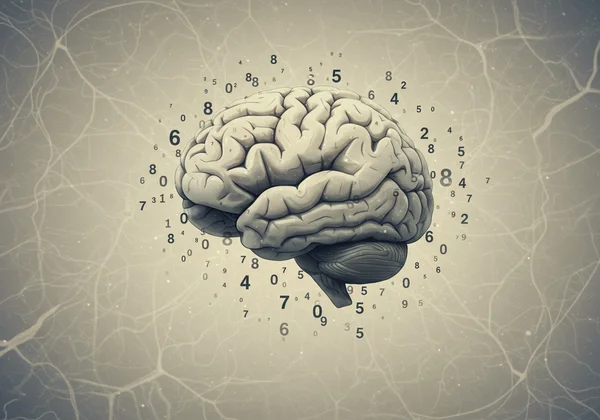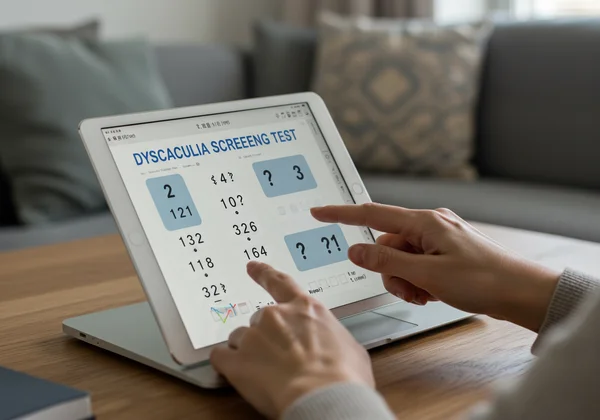Dyskalkulie-Leitfaden: Symptome, Screening & Informationsportal
August 26, 2025 | By Aisha Bennett
Haben Sie jemals Panik verspürt, wenn Sie mit Zahlen konfrontiert wurden? Fühlt sich das Berechnen eines Trinkgeldes, die Verwaltung eines Budgets oder sogar das Ablesen einer analogen Uhr wie eine unüberwindbare Herausforderung an? Für viele ist dies nicht nur eine Abneigung gegen Mathematik; es ist ein anhaltender Kampf, der den Alltag beeinträchtigt. Dieser umfassende Dyskalkulie-Leitfaden ist dazu da, das Rätsel der Zahlen zu entschlüsseln. Wir werden eine Schlüsselfrage untersuchen, die Sie sich vielleicht stellen: Ist es Dyskalkulie?
Dieser Leitfaden bietet Klarheit, Unterstützung und einen Weg nach vorn. Wir glauben, dass Verstehen der erste Schritt zur Selbstermächtigung ist. Wenn Sie vermuten, dass Sie oder jemand, der Ihnen am Herzen liegt, mit einer mathematischen Lernschwäche zu kämpfen hat, sind Sie hier genau richtig. Der Weg zu Antworten kann mit einem einzigen, einfachen Schritt beginnen. Sie können noch heute Klarheit erhalten mit einer ersten Einschätzung.
Was ist Dyskalkulie? Die mathematische Lernschwäche verstehen
Im Kern ist Dyskalkulie eine spezifische und anhaltende Lernstörung in der Mathematik. Sie wird oft als „Legasthenie für Zahlen“ beschrieben. Diese neurologische Lernbeeinträchtigung beeinträchtigt die Fähigkeit eines Individuums, arithmetische Fähigkeiten zu erwerben. Menschen mit Dyskalkulie können Schwierigkeiten haben, Zahlenkonzepte zu verstehen, die Menge von Gegenständen zu erfassen oder Berechnungen durchzuführen. Es ist entscheidend zu erkennen, dass dies keine Frage der Intelligenz oder Anstrengung ist.

Dyskalkulie definieren: Mehr als nur „schlecht in Mathe“
Der Satz „Ich bin einfach schlecht in Mathe“ ist weit verbreitet, aber Dyskalkulie ist weitaus tiefgreifender. Sie rührt von Schwierigkeiten im angeborenen „Zahlensinn“ des Gehirns her, der intuitiven Fähigkeit, Mengen zu verstehen und zu vergleichen. Während jemand mit fortgeschrittener Algebra Schwierigkeiten haben mag, steht eine Person mit Dyskalkulie vor Herausforderungen mit den grundlegendsten Bausteinen der Mathematik, wie dem Erkennen, dass die Ziffer „5“ fünf Gegenständen entspricht. Dies ist eine grundlegende mathematische Lernschwäche, die ein spezifisches Verständnis und spezifische Strategien erfordert.
Gängige Missverständnisse & Fakten über Dyskalkulie
Um Menschen mit Dyskalkulie wirklich zu unterstützen, müssen wir zuerst die Mythen zerstreuen. Sie wird nicht durch Faulheit, schlechten Unterricht oder mangelnde Motivation verursacht. Es handelt sich um eine echte kognitive Besonderheit, die von klein auf vorhanden ist. Eine der wichtigsten Tatsachen ist, dass Individuen mit der richtigen Unterstützung und den passenden Anpassungen effektive Bewältigungsstrategien entwickeln können, um akademisch und beruflich erfolgreich zu sein. Verständnis beginnt mit genauen Informationen, weshalb unser von Experten entwickelter Test geschaffen wurde, um einen zuverlässigen Ausgangspunkt zu bieten.
Die Anzeichen von Dyskalkulie in jedem Alter erkennen
Dyskalkulie äußert sich im Laufe des Lebens unterschiedlich. Das Erkennen der Anzeichen ist der erste Schritt für Eltern, Pädagogen und Erwachsene, die selbst nach Antworten suchen. Obwohl eine professionelle Diagnose zur Bestätigung notwendig ist, kann das Bewusstsein für die gängigen Indikatoren frühzeitige und wertvolle Maßnahmen auslösen. Ein Online-Dyskalkulie-Test kann ein ausgezeichneter erster Schritt sein, um diese Muster zu identifizieren.
Dyskalkulie-Symptome bei Kindern & Jugendlichen: Was Eltern und Pädagogen beachten sollten
Für Eltern und Lehrer ist es entscheidend, die frühen Symptome bei Kindern zu erkennen, um rechtzeitig Unterstützung bieten zu können. Ein Kind mit Dyskalkulie könnte:
- Schwierigkeiten haben, das Zählen zu lernen und Zahlen zu überspringen, lange nachdem Gleichaltrige es gemeistert haben.
- Mühe haben, gedruckte Zahlen zu erkennen oder sie mit Mengen in Verbindung zu bringen.
- Lange nachdem es altersgerecht ist, Finger zum Zählen benutzen müssen.
- Schwierigkeiten haben, grundlegende mathematische Fakten, wie 2+2=4, abzurufen.
- Mit Konzepten wie „größer als“ oder „kleiner als“ kämpfen.
- Schwierigkeiten haben, die Uhrzeit auf einer analogen Uhr abzulesen oder Geld zu verwalten.
Bei Teenagern können sich diese Herausforderungen zu erheblicher Mathematikangst, Schwierigkeiten mit Diagrammen und Grafiken sowie Problemen mit mehrstufigen Aufgaben entwickeln.

Anzeichen von Dyskalkulie bei Erwachsenen erkennen: Wenn alltägliche Mathematik zur Herausforderung wird
Viele Erwachsene haben ihr ganzes Leben lang Angst und Unsicherheit bezüglich ihrer mathematischen Fähigkeiten empfunden, ohne zu wissen, dass es einen zugrunde liegenden Grund geben könnte. Dyskalkulie bei Erwachsenen kann die Karriere und das tägliche Leben einer Person erheblich beeinträchtigen. Häufige Anzeichen sind:
- Extreme Schwierigkeiten mit Kopfrechnen, oft verbunden mit der Notwendigkeit eines Taschenrechners für einfache Berechnungen.
- Angst, wenn Aufgaben Zahlen beinhalten, wie Budgetplanung oder das Teilen einer Rechnung.
- Probleme beim Schätzen von Kosten, Entfernungen oder Zeit.
- Häufiges Verlaufen oder ein schlechtes Orientierungsgefühl.
- Schwierigkeiten beim Erinnern von Telefonnummern, Postleitzahlen oder Spielständen.
Wenn Ihnen diese Herausforderungen bekannt vorkommen, wissen Sie, dass Sie nicht allein sind. Das Verständnis der Ursache dieser Schwierigkeiten kann lebensverändernd sein, und ein vertraulicher Dyskalkulie-Test für Erwachsene ist ein privater Weg, um Ihre Erkundung zu beginnen.
Dyskalkulie-Screening: Ihr erster Schritt zur Klarheit
Wenn Sie die Anzeichen von Dyskalkulie bei sich oder einem geliebten Menschen erkennen, lautet die nächste logische Frage: „Was nun?“ Der Weg zum Verständnis beginnt oft mit einem Screening. Ein Dyskalkulie-Screening ist ein vorläufiger Schritt, der dazu dient, festzustellen, ob eine Person Merkmale aufweist, die mit dieser Lernschwäche übereinstimmen. Es liefert die erste Einsicht, die für die Entscheidung über weitere Maßnahmen erforderlich ist.
Warum Online-Dyskalkulie-Screening für frühe Einblicke wichtig ist
In der heutigen Welt bietet ein Online-Screening einen zugänglichen, privaten und nicht einschüchternden ersten Schritt. Es beseitigt die Barrieren der Terminplanung und potenziellen Kosten, die mit formalen Bewertungen verbunden sind. Es ermöglicht Eltern, Erwachsenen und Pädagogen, wertvolle erste Hinweise bequem von zu Hause aus zu gewinnen und sie mit Informationen zu versorgen, die ihre nächsten Schritte leiten.
Wie unser kostenloser Online-Dyskalkulie-Test funktioniert
Wir glauben, dass jeder Zugang zu hochwertigen Ressourcen verdient. Unser Prozess ist einfach und ermutigend. Sie beginnen damit, eine Reihe sorgfältig ausgearbeiteter Fragen zu beantworten, die von Bildungspsychologen und Mathematikexperten entwickelt wurden. Diese Fragen bewerten verschiedene Aspekte des Zahlensinns und des mathematischen Denkens. Nach Abschluss erhalten Sie eine sofortige Zusammenfassung Ihrer Ergebnisse. Für diejenigen, die mehr möchten, können Sie eine detaillierte, KI-gestützte Analyse freischalten, die ein personalisiertes kognitives Profil und maßgeschneiderte Unterstützungsstrategien bietet. Sie können den kostenlosen Test jetzt starten.

Ihre Screening-Ergebnisse interpretieren & nächste Schritte verstehen
Es ist wichtig, Ihre Ergebnisse mit der richtigen Perspektive zu betrachten. Unser kostenloser Dyskalkulie-Test ist ein Screening-Tool, keine medizinische Diagnose. Die Ergebnisse zeigen eine geringe, mittlere oder hohe Wahrscheinlichkeit von Dyskalkulie-Merkmalen an. Wenn Ihre Ergebnisse eine hohe Wahrscheinlichkeit nahelegen, ist der empfohlene nächste Schritt, einen Bildungspsychologen oder einen qualifizierten Fachmann für eine formale diagnostische Beurteilung zu konsultieren. Dieses Screening befähigt Sie mit den vorläufigen Daten, um ein fundierteres Gespräch zu führen.
Effektive Strategien & Unterstützung zur Bewältigung von Dyskalkulie
Eine Dyskalkulie-Indikation zu erhalten, ist kein Endpunkt, sondern der Beginn eines neuen, informierteren Ansatzes für das Lernen und das Leben. Es gibt unzählige effektive Strategien und Unterstützungssysteme, die helfen, die Herausforderungen zu bewältigen und die Stärken zu nutzen, die mit dieser Lernschwäche verbunden sind.
Praktische Strategien für den Alltag mit Dyskalkulie
Das Leben mit Dyskalkulie kann durch einfache Anpassungen leichter gemacht werden. Der Einsatz von Technologie ist ein Wendepunkt; verlassen Sie sich beim Einkaufen und Trinkgeld auf den Taschenrechner Ihres Telefons. Stellen Sie Wecker und Timer ein, um das Zeitmanagement zu erleichtern. Für die Budgetplanung verwenden Sie Apps, die Ausgaben mit Diagrammen und Farben visualisieren. Das Aufteilen von zahlenlastigen Aufgaben in kleinere, überschaubare Schritte kann auch Überforderung und Angst reduzieren.

Pädagogische & berufliche Anpassungen für Dyskalkulie
Formale pädagogische Anpassungen können für Schüler einen großen Unterschied machen. Dazu gehören möglicherweise zusätzliche Zeit bei Tests, die Verwendung eines Taschenrechners im Unterricht oder Zugang zu Notizen mit Formeln. Am Arbeitsplatz können ähnliche Anpassungen beantragt werden, wie z. B. die Bereitstellung schriftlicher Anweisungen für mehrstufige Aufgaben oder die Verwendung von Software zur Unterstützung bei der Dateneingabe und -analyse.
Empfohlene Werkzeuge und Ressourcen zur Unterstützung des Lernens
Es gibt eine Fülle von empfohlenen Werkzeugen, die darauf ausgelegt sind, das Mathematiklernen zu unterstützen. Multisensorische Lernansätze, die Sehen, Hören und Tasten ansprechen, sind hochwirksam. Lern-Apps und Spiele können das Üben von mathematischen Fakten ansprechender gestalten. Die Verwendung von kariertem Papier, um Zahlen und Spalten auszurichten, kann bei der Sauberkeit und Genauigkeit von Berechnungen helfen. Der Schlüssel liegt darin, herauszufinden, was für Sie funktioniert, und eine Toolbox mit unterstützenden Ressourcen aufzubauen. Mit den richtigen Strategien können Sie Ihren Weg zum Erfolg finden.
Ihre Reise stärken: Dyskalkulie verstehen & Unterstützung finden
Die Navigation in der Welt der Zahlen kann herausfordernd sein, aber zu verstehen, dass eine echte, neurologische Differenz wie Dyskalkulie die Ursache sein kann, ist unglaublich validierend. Es verschiebt die Erzählung von „Ich kann nicht“ zu „Ich lerne anders“. Von der Identifizierung der Anzeichen bei Kindern und Erwachsenen bis zur Erforschung effektiver Strategien ist dieser Leitfaden als Ihr unterstützendes Zentrum für Informationen und Maßnahmen konzipiert.
Wissen ist Macht, und Klarheit ist der erste Schritt zum Aufbau von Selbstvertrauen. Sie müssen nicht schweigend zweifeln. Machen Sie den ersten Schritt zum Verständnis, indem Sie noch heute unser kostenloses, von Experten entwickeltes Dyskalkulie-Screening ausprobieren.
Häufig gestellte Fragen zu Dyskalkulie
Wie wird auf Dyskalkulie getestet?
Die Testung auf Dyskalkulie umfasst typischerweise eine umfassende Beurteilung durch einen Bildungspsychologen. Ein guter Ausgangspunkt ist jedoch ein Online-Screening-Tool. Eine zuverlässige Dyskalkulie-Einschätzung, wie die, die wir anbieten, kann Schlüsselmerkmale identifizieren und anzeigen, ob eine formale Beurteilung ein empfohlener nächster Schritt ist.
Habe ich Dyskalkulie oder bin ich einfach schlecht in Mathe?
Dies ist eine sehr häufige und berechtigte Frage. Während viele Menschen Mathematik als herausfordernd empfinden, beinhaltet Dyskalkulie eine anhaltende und tiefgreifende Schwierigkeit mit grundlegenden Zahlenkonzepten. Wenn Ihre Schwierigkeiten mit Mathematik langjährig sind, erhebliche Angst verursachen und Ihr tägliches Leben beeinträchtigen, lohnt es sich, dies genauer zu untersuchen. Eine gute Möglichkeit, erste Einblicke zu gewinnen, ist einen Screening-Test zu machen.
Was sind die Anzeichen von Dyskalkulie bei Erwachsenen?
Wesentliche Anzeichen bei Erwachsenen umfassen oft intensive Angst vor mathematischen Aufgaben, Schwierigkeiten bei der Verwaltung von Finanzen oder einem Budget, Probleme beim Schätzen von Zeit oder Entfernungen und die Abhängigkeit von einem Taschenrechner für sehr einfache Berechnungen. Viele Erwachsene berichten auch von Schwierigkeiten, Zahlenfolgen wie Telefonnummern oder PINs zu merken.
Gibt es einen kostenlosen Dyskalkulie-Test online?
Ja, den gibt es. Wir bieten einen umfassenden, völlig kostenlosen Dyskalkulie-Test an, der von Experten für Bildungspsychologie und Mathematik entwickelt wurde. Er dient als zuverlässiger erster Schritt, um Ihnen zu helfen, Ihr einzigartiges kognitives Profil zu verstehen und Zugangsstrategien zur Unterstützung zu erhalten. Sie können unser kostenloses Screening-Tool auf unserer Homepage aufrufen.